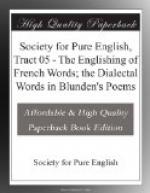18. ‘where with the browsing thaive’. (31)
#Thaive# is a two-year-old ewe. Wright gives theave or theeve as the commoner forms, and in the Paston letters it is theyve, which perhaps confirms thaive, rhymed here with ‘rave’. Certainly it is most advisable to avoid thieves, the plural of thief, although O.E.D. allows this pronunciation and indeed puts it first of the alternatives.
19. ‘On the pathway side ... the glintering flint’. (32)
O.E.D. gives #glinter# as a ‘rare’ word. We have glinting, glistening, glittering, and glistering, and Scotch glisting.
20. ‘The wind tangs through the shattered pane’. (34)
Echo-words, like ting-tang, ding-dong, &c., must have their liberty; but of #tang# it should be noted that, though the verb may raise no inconvenience, yet the substantive has a very old and well-established use in the sense of a projecting point or barb (especially of metal), or sting, and that this demands respect and recognition. It is something less than prong, and is the proper word for the metal point that fixes the strap of a buckle. The homophonic ambiguity is notorious in Shakespeare’s
‘She had a tongue with a tang’,
where, as the O.E.D. suggests, the double sense of sting and ring were perhaps intended.
21. ‘The grutching pixies hedge me round’. (37)
Grudge and #grutch# are the same word. The use of the obsolete form would therefore be fanciful if there were no difference in the sense; but there is a useful distinction: because grudge has entirely lost its original sense of murmuring, making complaint, and is confined to the consciousness and feeling of discontent, whereas grutch is recognized as carrying the old meaning of grumble. Thus Stevenson as quoted in O.E.D., ‘The rest is grunting and grutching’. It is a very useful word to restore, but it may, perhaps, at this particular time find grouse rather strongly entrenched.
22. ‘Where the channering insect channels’. (46)
This is, of course, our old friend
The
cock doth craw, the day doth daw,
The
channerin’ worm doth chide’,
and it looks like an attempt to define what is there meant, viz. that the worm made a #channering# noise in burrowing through the wood. The notion is perhaps admissible, though we cannot believe the sound to be audible.
23. ‘The lispering aspens’. (53)
#Lispering.# We should be grateful for this word. O.E.D. quotes it from Clare’s poems.
24. ‘Of shallows with the shealings chalky white’. (64)
#Sheal# is a homophone, 1. a shepherd’s hut or shanty; 2. a peascod or seed-shell. Of the first, shiel and shieling are common forms; the second is dialectal; E.D.D. gives #shealing# as the husk of seeds. If this be the meaning in our quotation, the appearance described is unrecognized by the present annotator.




